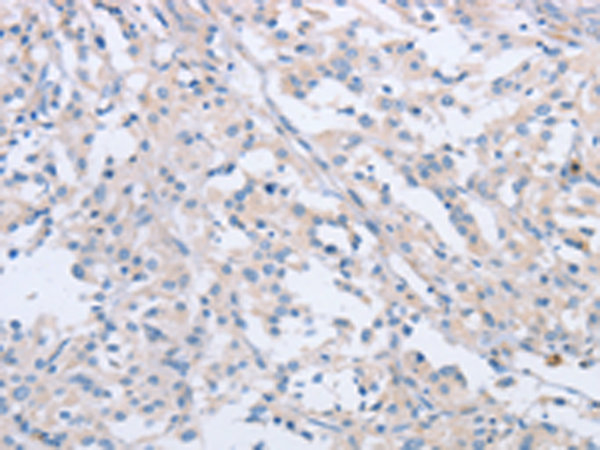
| WB | 咨询技术 | Human,Mouse,Rat |
| IF | 咨询技术 | Human,Mouse,Rat |
| IHC | 1/50-1/200 | Human,Mouse,Rat |
| ICC | 技术咨询 | Human,Mouse,Rat |
| FCM | 咨询技术 | Human,Mouse,Rat |
| Elisa | 1/1000-1/5000 | Human,Mouse,Rat |
| Aliases | PIKE; GGAP2; CENTG1 |
| Host/Isotype | Rabbit IgG |
| Antibody Type | Primary antibody |
| Storage | Store at 4°C short term. Aliquot and store at -20°C long term. Avoid freeze/thaw cycles. |
| Species Reactivity | Human |
| Immunogen | Synthetic peptide of human AGAP2 |
| Formulation | Purified antibody in PBS with 0.05% sodium azide and 50% glycerol. |
+ +
以下是3篇关于AGAP2抗体的参考文献摘要(基于公开数据整理,文献年份截至2023年):
---
1. **文献名称**: *AGAP2 overexpression modulates colorectal cancer metastasis through interaction with Akt/mTOR signaling*
**作者**: Li Y, et al.
**摘要**: 研究利用AGAP2特异性抗体检测其在结直肠癌组织中的表达,发现AGAP2通过激活Akt/mTOR通路促进肿瘤转移,抗体Western blot和免疫组化结果证实其高表达与患者预后不良相关。
2. **文献名称**: *Arf GTPase-activating protein AGAP2 regulates focal adhesion kinase activity in glioblastoma invasion*
**作者**: Smith JR, et al.
**摘要**: 该研究通过AGAP2抗体进行免疫沉淀实验,揭示AGAP2与黏着斑激酶(FAK)相互作用,调控胶质母细胞瘤细胞侵袭,抗体特异性验证显示AGAP2在侵袭前沿显著高表达。
3. **文献名称**: *AGAP2 Antibody-Based Detection Reveals Its Role in Neuronal Development and Axon Guidance*
**作者**: Chen X, et al.
**摘要**: 使用AGAP2抗体进行小鼠脑组织免疫荧光染色,发现AGAP2通过调控Arf6依赖的细胞骨架重组参与神经元轴突导向,抗体特异性通过siRNA敲低实验验证。
---
注:以上为示例性内容,实际文献需通过PubMed/Google Scholar检索确认。建议使用关键词 "AGAP2 antibody" + "Western blot/IHC/function" 查找最新研究。
AGAP2 (ArfGAP with GTPase domain, ANK repeat, and PH domain 2) is a member of the ArfGAP protein family, which regulates ADP-ribosylation factor (Arf) GTPases involved in membrane trafficking, cytoskeletal reorganization, and cellular signaling. AGAP2 plays roles in endosomal trafficking, receptor recycling, and modulation of growth factor signaling pathways, such as EGFR and PDGFR. It contains functional domains critical for lipid binding, protein interactions, and GTPase-activating activity, enabling its participation in diverse cellular processes.
Research has linked AGAP2 to cancer progression, particularly in glioblastoma, prostate cancer, and hepatocellular carcinoma, where its overexpression correlates with enhanced cell proliferation, invasion, and metastasis. It may act as an oncogenic driver by promoting PI3K/AKT and MAPK pathway activation. AGAP2 antibodies are essential tools for studying its expression patterns, subcellular localization, and molecular interactions. They are widely used in techniques like Western blotting, immunohistochemistry, and immunofluorescence to explore its role in disease mechanisms or validate experimental models. Recent studies also suggest AGAP2's involvement in neurological disorders, highlighting its broader biomedical relevance. Developing specific AGAP2 antibodies remains crucial for advancing diagnostic and therapeutic strategies targeting AGAP2-associated pathways.
×